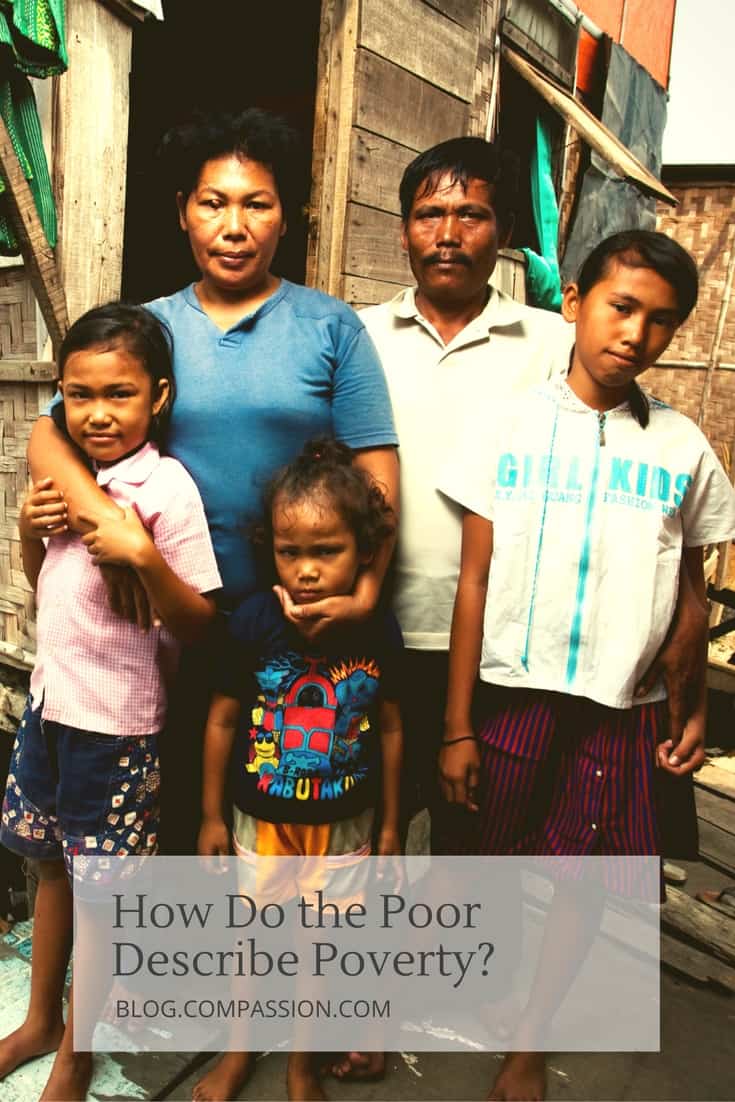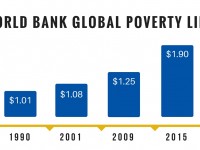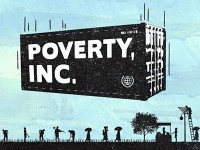Although the World Bank established the most widely held and understood definition of poverty in strictly economic terms, the World Bank has also described poverty as follows:
Poverty is hunger. Poverty is lack of shelter. Poverty is being sick and not being able to see a doctor. Poverty is not having access to school and not knowing how to read. Poverty is not having a job, is fear for the future, living one day at a time. Poverty is losing a child to illness brought about by unclean water. Poverty is powerlessness, lack of representation and freedom.
This description of poverty includes lack of access to social services, “fear for the future,” “powerlessness” and “lack of representation.” This description shows a broadening of the World Bank’s understanding of poverty, but it does not replace or contradict its own $1.90 per day standard for extreme poverty.
The World Bank has also developed indicators to assess non-income dimensions of poverty. These indicators include education, health, access to social services, vulnerability, social exclusion, and access to social capital.
During the mid to late 1990s, Robert Chambers, research associate at the Institute of Development Studies at the University of Sussex, and others questioned the definitions of poverty and asked who should determine those definitions. The argument was that the poor themselves should define poverty.

How Do the Poor Describe Poverty?
A survey conducted in Niger in 2002 by the Office of the Prime Minister asked the poor of that country to describe poverty. Their answers provided the following:
- Dependence was mentioned by 40 percent of the respondents, with some noting that a poor person always had to “seek out others” or to “work for somebody else.”
- Marginalization was noted by 37 percent, who defined a poor person as one who was “alone,” had “no support,” did “not feel involved in anything,” or was “never consulted.”
- Scarcity was included in the poverty definitions of 36 percent, who used statements such as having “nothing to eat,” a “lack of means to meet clothing and financial needs,” a “lack of food, livestock and money,” and “having nothing to sell.”
- Restrictions on rights and freedoms were associated with poverty by 26 percent of the respondents, who stated that “a poor person is someone who does not have the right to speak out” or “someone who will never win a case or litigation against someone else.”
- Incapacity was mentioned in connection with poverty by 21 percent, including the incapacity to make decision, to feed or clothe oneself, or to act on one’s own initiative.
Only 36 percent of the poor in this survey described poverty in terms of material lack [scarcity]. Here, the poor described the experience of poverty primarily in terms of suffering relationships and lack of belonging, dignity and freedom. Similar descriptions were found in a major World Bank study published in 2000, Voices of the poor: Can anyone hear us?
The poor describe poverty in terms of suffering relationships. Relationships are central to a person’s belonging, identity, affirmation and other socio-emotional needs.
The relational fabric of a person is his or her means for navigating social norms, accessing resources and mobilizing the skills of others toward common goals. “Whom you know” matters a great deal in any context, including that of a poor man or woman navigating his or her way out of poverty.
Learn about how the Bible defines poverty.
<hr/ > This was originally published in May of 2010.








11 Comments |Add a comment
I have just shared with one of my sponsored children in my letter that poverty in our culture (Japan) is invisible and is worse, because people here do not realize how truly poor and miserable they are.
Ours may not be lack of food, clothes or education, but lack of awe and this lack is the root of all kinds of evil and makes man truly “poor”.
We might be the third richest nation in the world according GNP, but in terms of true riches, or fear of God, we might be at the very bottom.
So a sponsorship results in raising the personal power of an impoverished child and their family because they are now attached to someone “important”. What a small effort it is for me to share my ‘importance’ with someone.
Relationships can be used for corruption as in politics or as with the pharisees. Jesus… It’s about Jesus. That is THE relationship that is distinctive and motivates Mary to be lavish in worship while not disparaging Martha’s more practical efforts. The dwelling place of Jesus is in the very core of our being which is modeled in the flesh by Jesus, through communion and through heartfelt service. Jesus is the motivation, not some perception of poverty.
I love this. True poverty I’m learning is a lack of hope. Economic poverty is a very real injustice and can be eliminated if we handle our resources differently but true poverty is something that only Jesus can cure.Gives a whole new perspective when we hear the bible describe the church as Jesus’ hands and feet, huh?
Psalm 118:24 (Amplified Bible)
24This is the day which the Lord has brought about; we will rejoice and be glad in it.
I absolutely love this blog post. It shows me, in a whole new way, what we give to children through Compassion. Independence vs. dependence. Support and involvement vs. marginalization. Resources vs. scarcity. Empowerment vs. restrictions and incapacity. Great job putting this out there, Scott Todd!
Hey, to the powers that be, could you do a blog post, (or have you done a blog post?), on the Ten Program i.e. Corruption Has a Date with Destiny? I’d like to know more about that program. I get the jist that it has something to do with the Leadership Development Program, but I’d like to know more.
To the previous poster who asked, where are the Christian thinkers? — the teachers, doctors, lawyers — where are they? I like to think that what Compassion is doing is RAISING UP the next generation of Christian thinkers — teachers, doctors, lawyers — who will be uniquely prepared and positioned for leadership in their countries. I think that’s what the Leadership Development Program is doing in a really unique and groundbreaking way.
An interesting report however I think it misses the crucial problem of the particular cultural authority in any country. Cultural authority affect economics and it also affect politics but neither of these aspects of human life can affect the cultural authority of a country. The cultural authority of a country determines how human beings are viewed in that country. Pol Pot and Hitler did not kill people after the Christian tradition, but after a humanist ideology. No ammount of money or political games could have prevented these tragedies. Countries and their peoples’ live according to the cultural consensus in that country. We would be foolish to think that a country like China or Yemen would share the Christian ideas about what people are. Unless the cultural authority of a country like Afghanistan or Australia changes, there is no reason for the population to change either. In Australia our record on indigenous affairs ranks last in the developed world yet few Australian’s know this including Christian’s. Indigenous of Australia still rank behind other ethnic groups in Australia as the media tell us all the time.
What is it that moves Jesus with compassion as the Bible reports? Is it the sin and suffering and the depravity of life that his eyes brings to him that moves Jesus? Or, is it the hole inside the human mind out from where his depravity comes?
As long as people are dealing with what their eyes bring to them, they can only help the minority in any country or those that come across their way. Otherwise it is a never ending blind evangelical endeavor, that whilst it gains support and a little momentum now and then, the feeling seems to be a losing feeling.
China massacred thousands of its students in 1989 and vehemently denied the event despite the wide media coverage locally and internationally. Richard Rorty the atheist thinker said that truth is something your neighbors will let you get away with saying. China denied the event and were rewarded with an Olympic games in 2008. In 2009 the world celebrated the 20th anniversary or the Tienanmen Square massacre. Recently Kevin Rudd said sorry to 50,000 indigenous people’s whilst forgetting the other 1,000,000 indigenous who have for 200 years bore the brunt of a subtle humanist context that is Australia today. Why does their health lag 20 years behind my health and yours? Why is their education 5 years behind that of other Australian’s? Why has their linguistic base vanished in less than 200 years.
We have our own poverty to deal with here before we go into anyone else’s backyard. The whole world has been watching us for a very long time. Unfortunately history shows us that the cultural authority in Australia, is not a Christian one despite their being many wonderful Christian people in Australia. We are in the majority even more now we have a pagan and her boyfriend running the country.
Where are all the Christian thinkers? The teachers, doctors, lawyers, where are they and what have they been doing?????
We have our own poor in Australia who cut off from main stream society in so many ways
It almost sounds like you are hurting and full of anger from your inability to help others. Helping others takes many forms, whether it’s educating your own child or educating someone who otherwise could not escape poverty. If everyone chose to make this world a better place buy helping and uplifting others, there would be fewer miseries for all.
Hona, I think Hitler could have been stopped. What if Christians not only in Germany but around the world took action. It was left to governments to act (of course a few exceptions). Where was the church in Germany during this time? Did they and others think since it didn’t impact them, since they were safe, that involvement wasn’t needed? So sad.
Very interesting! Another thing to support the importance of writing to your sponsored children!!
Thank you for posting this. It further motivates me to continue writing to my sponsored-children’s parents, as well as my children. I want their parents to know that they are not alone…that someone cares very much for them.
Thank you again for the work of Compassion.